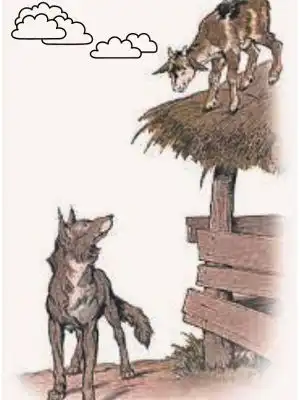The Wolf and the Lamb
A lost Lamb stood drinking early one morning on the bank of a woodland stream. That very same morning a hungry Wolf came by farther up the stream, hunting for something to eat. He soon got his eyes on the Lamb.

As a rule, Mr. Wolf snapped up such delicious bites without making any fuss about it, but this Lamb looked so very helpless and innocent that the Wolf felt he ought to have some kind of a reason for taking its life.
“How dare you paddle around in my stream and stir up all the mud!” he shouted fiercely. “You deserve to be punished severely for your rashness!”
“But, your highness,” replied the trembling Lamb, “do not be angry! I cannot possibly muddy the water you are drinking up there. Remember, you are upstream and I am downstream.”
“You do muddy it!” retorted the Wolf savagely. “And besides, I have heard that you told fibs about me last year!” “How could I have done so?” pleaded the Lamb. “I wasn’t born until this year.”
“If it wasn’t you, it was your brother!”
“I have no brothers.”
“Well, then,” snarled the Wolf, “It was someone in your family anyway. But no matter who it was, I do not intend to be talked out of my breakfast.”
And without more words, the Wolf seized the poor Lamb and carried her off to the forest.
Moral of the story
Be careful who you trust: Some people may find excuses to do something wrong even when it’s not justified. Speak up for yourself: Even when you’re innocent, it’s important to stand up for the truth.
Questions for the children
- How do you think the Lamb felt when the Wolf accused it of things it didn’t do?
- Can you recall a time when you had to speak up for yourself, even when someone accused you wrongly?
Post Note: This story is based on Aesop’s fable, written around 600 BC. In this retelling, we’ve used simpler words to make the story easier for young readers to understand.





